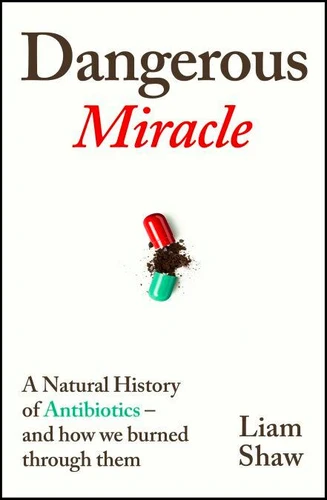Dangerous Miracle. A natural history of antibiotics – and how we burned through them
Par :Formats :
Disponible dans votre compte client Decitre ou Furet du Nord dès validation de votre commande. Le format ePub protégé est :
- Compatible avec une lecture sur My Vivlio (smartphone, tablette, ordinateur)
- Compatible avec une lecture sur liseuses Vivlio
- Pour les liseuses autres que Vivlio, vous devez utiliser le logiciel Adobe Digital Edition. Non compatible avec la lecture sur les liseuses Kindle, Remarkable et Sony
- Non compatible avec un achat hors France métropolitaine
 , qui est-ce ?
, qui est-ce ?Notre partenaire de plateforme de lecture numérique où vous retrouverez l'ensemble de vos ebooks gratuitement
Pour en savoir plus sur nos ebooks, consultez notre aide en ligne ici
- Nombre de pages352
- FormatePub
- ISBN978-1-5299-3379-6
- EAN9781529933796
- Date de parution21/08/2025
- Protection num.Adobe DRM
- Infos supplémentairesepub
- ÉditeurVintage Digital
Résumé
'A riveting book . In combining the passion of Robert Macfarlane with the incisiveness of Patrick Radden Keefe, Shaw has announced himself as a brilliant new voice in science writing' RACHEL CLARKE, SPECTATORAntibiotics are one of humanity's greatest achievements but our access to them is under threat. Discover their miraculous history - and how we confront their uncertain future. Since their advent, antibiotics have saved millions of lives, marking one of the greatest medical advances in our history.
Dangerous Miracle weaves together the grand arc of the evolution of antibiotics over millions of years with a history of the past century: first as we mined the earth for naturally occurring antibiotic molecules, then as we learned to synthesise our own. But like fossil fuels, antibiotics are a finite resource which we've regarded as a cheap, everlasting fuel. They are unlike other drugs: every time we use them we increase the possibility of antibiotic resistance emerging, risking their future effectiveness.
If we want antibiotics to have a future, we need to prepare to adapt. And fast.'Excellent' HENRY MARSH'Brilliant' TIM SPECTOR'Fascinating' SARAH GILBERT'Eye-opening and thrilling' MATTHEW COBB'Absolutely essential' KATE BINGHAM
Dangerous Miracle weaves together the grand arc of the evolution of antibiotics over millions of years with a history of the past century: first as we mined the earth for naturally occurring antibiotic molecules, then as we learned to synthesise our own. But like fossil fuels, antibiotics are a finite resource which we've regarded as a cheap, everlasting fuel. They are unlike other drugs: every time we use them we increase the possibility of antibiotic resistance emerging, risking their future effectiveness.
If we want antibiotics to have a future, we need to prepare to adapt. And fast.'Excellent' HENRY MARSH'Brilliant' TIM SPECTOR'Fascinating' SARAH GILBERT'Eye-opening and thrilling' MATTHEW COBB'Absolutely essential' KATE BINGHAM
'A riveting book . In combining the passion of Robert Macfarlane with the incisiveness of Patrick Radden Keefe, Shaw has announced himself as a brilliant new voice in science writing' RACHEL CLARKE, SPECTATORAntibiotics are one of humanity's greatest achievements but our access to them is under threat. Discover their miraculous history - and how we confront their uncertain future. Since their advent, antibiotics have saved millions of lives, marking one of the greatest medical advances in our history.
Dangerous Miracle weaves together the grand arc of the evolution of antibiotics over millions of years with a history of the past century: first as we mined the earth for naturally occurring antibiotic molecules, then as we learned to synthesise our own. But like fossil fuels, antibiotics are a finite resource which we've regarded as a cheap, everlasting fuel. They are unlike other drugs: every time we use them we increase the possibility of antibiotic resistance emerging, risking their future effectiveness.
If we want antibiotics to have a future, we need to prepare to adapt. And fast.'Excellent' HENRY MARSH'Brilliant' TIM SPECTOR'Fascinating' SARAH GILBERT'Eye-opening and thrilling' MATTHEW COBB'Absolutely essential' KATE BINGHAM
Dangerous Miracle weaves together the grand arc of the evolution of antibiotics over millions of years with a history of the past century: first as we mined the earth for naturally occurring antibiotic molecules, then as we learned to synthesise our own. But like fossil fuels, antibiotics are a finite resource which we've regarded as a cheap, everlasting fuel. They are unlike other drugs: every time we use them we increase the possibility of antibiotic resistance emerging, risking their future effectiveness.
If we want antibiotics to have a future, we need to prepare to adapt. And fast.'Excellent' HENRY MARSH'Brilliant' TIM SPECTOR'Fascinating' SARAH GILBERT'Eye-opening and thrilling' MATTHEW COBB'Absolutely essential' KATE BINGHAM



